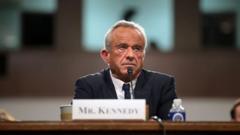RFK Jr.'s confirmation hearing revealed contentious discussions on vaccines, abortion rights, and health policy, reflecting the divided opinions among senators.
RFK Jr's Confirmation Hearing: Key Highlights and Controversies

RFK Jr's Confirmation Hearing: Key Highlights and Controversies
Robert F. Kennedy Jr. faced fierce questioning on various topics during his first confirmation hearing as Trump's health secretary nominee.
Article Text:
In a highly anticipated first confirmation hearing, Robert F. Kennedy Jr., nominated by former President Donald Trump for the position of US health secretary, faced significant scrutiny from senators on Wednesday. This pivotal role is responsible for leading crucial public health initiatives, overseeing medical progress, food safety, and welfare programs.
Kennedy, known for his controversial stance on vaccinations, was interrogated about his previous statements concerning the Covid-19 vaccine and his broader views on immunizations. His advocacy and leadership of Children's Health Defense drew criticism, with senators probing into his longstanding skepticism regarding vaccine safety, including unfounded claims linking vaccines to autism. In defending himself, Kennedy claimed he is not anti-vaccine but advocates for more thorough safety protocols. He emphasized he supports the existing vaccination schedule but challenged certain vaccine narratives, arguing his remarks were misconstrued.
Among the more salient points raised during the hearing was Kennedy’s criticism of processed foods, attributing the rise of chronic health issues to the American diet. He expressed a commitment to evaluating food safety regulations and aiming to alleviate financial corruption within federal food safety agencies. Despite his strong stance on improving nutrition, he assured senators that he would not restrict access to fast food options, referencing Trump's fondness for McDonald's.
The issue of abortion also surfaced prominently, as Kennedy was questioned on his previously pro-choice stance. He characterized every abortion as a tragedy and noted that medical professionals holding ethical or religious objections should not be compelled to perform them. He maintained that the decision around abortion access ought to rest within state jurisdictions.
Senator Bernie Sanders challenged Kennedy on various points, including universal healthcare access and his views on anti-vaccine merchandise sold through his former organization. Kennedy acknowledged he no longer supervises the organization, which prompted Sanders to present imagery of baby clothing featuring anti-vaccine messages.
Responses from senators varied significantly along party lines. While Democrats focused predominantly on his past anti-vaccine assertions and implications for public health misinformation, Republican senators were more supportive of Kennedy’s health initiatives and criticisms of processed foods. Notably, Senator Ron Johnson praised Kennedy's nomination, whereas Democratic Senator Ron Wyden accused him of evading critical health issues.
Following this hearing before the Senate finance committee, Kennedy is scheduled for another round of inquiries with the health, education, labor, and pensions committee. Following these sessions, votes on his nomination will be held before it progresses to the wider Senate for consideration.
In a highly anticipated first confirmation hearing, Robert F. Kennedy Jr., nominated by former President Donald Trump for the position of US health secretary, faced significant scrutiny from senators on Wednesday. This pivotal role is responsible for leading crucial public health initiatives, overseeing medical progress, food safety, and welfare programs.
Kennedy, known for his controversial stance on vaccinations, was interrogated about his previous statements concerning the Covid-19 vaccine and his broader views on immunizations. His advocacy and leadership of Children's Health Defense drew criticism, with senators probing into his longstanding skepticism regarding vaccine safety, including unfounded claims linking vaccines to autism. In defending himself, Kennedy claimed he is not anti-vaccine but advocates for more thorough safety protocols. He emphasized he supports the existing vaccination schedule but challenged certain vaccine narratives, arguing his remarks were misconstrued.
Among the more salient points raised during the hearing was Kennedy’s criticism of processed foods, attributing the rise of chronic health issues to the American diet. He expressed a commitment to evaluating food safety regulations and aiming to alleviate financial corruption within federal food safety agencies. Despite his strong stance on improving nutrition, he assured senators that he would not restrict access to fast food options, referencing Trump's fondness for McDonald's.
The issue of abortion also surfaced prominently, as Kennedy was questioned on his previously pro-choice stance. He characterized every abortion as a tragedy and noted that medical professionals holding ethical or religious objections should not be compelled to perform them. He maintained that the decision around abortion access ought to rest within state jurisdictions.
Senator Bernie Sanders challenged Kennedy on various points, including universal healthcare access and his views on anti-vaccine merchandise sold through his former organization. Kennedy acknowledged he no longer supervises the organization, which prompted Sanders to present imagery of baby clothing featuring anti-vaccine messages.
Responses from senators varied significantly along party lines. While Democrats focused predominantly on his past anti-vaccine assertions and implications for public health misinformation, Republican senators were more supportive of Kennedy’s health initiatives and criticisms of processed foods. Notably, Senator Ron Johnson praised Kennedy's nomination, whereas Democratic Senator Ron Wyden accused him of evading critical health issues.
Following this hearing before the Senate finance committee, Kennedy is scheduled for another round of inquiries with the health, education, labor, and pensions committee. Following these sessions, votes on his nomination will be held before it progresses to the wider Senate for consideration.





















